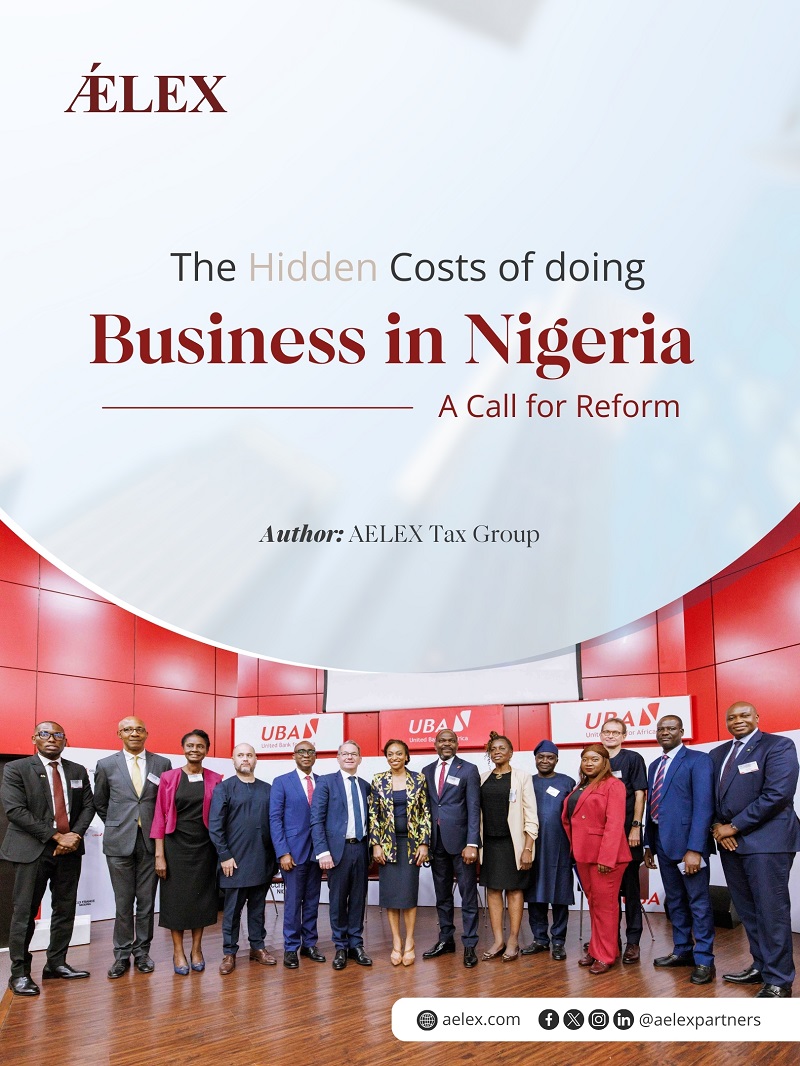On 28 January 2025, the Head of Tax Practice at AELEX, Mr. Theophilus Emuwa, voiced his concerns regarding the hidden non-tax costs that businesses in Nigeria face. He shared these insights at the Breakfast Meeting organized by the Franco-Nigerian Chamber of Commerce and Industry (“FNCCI”) in collaboration with the United Bank for Africa. Themed “Nigeria in 2025: Economy, Policy and Collaboration,” the event provided a platform to discuss key economic and policy issues affecting businesses in Nigeria.
On 28 January 2025, the Head of Tax Practice at AELEX, Mr. Theophilus Emuwa, voiced his concerns regarding the hidden non-tax costs that businesses in Nigeria face. He shared these insights at the Breakfast Meeting organized by the Franco-Nigerian Chamber of Commerce and Industry (“FNCCI”) in collaboration with the United Bank for Africa. Themed “Nigeria in 2025: Economy, Policy and Collaboration,” the event provided a platform to discuss key economic and policy issues affecting businesses in Nigeria.
A Growing Concern for Investors
During the panel session, moderated by FNCCI’s Director General, Moses Umoru, Mr. Emuwa highlighted how excessive regulatory fees and levies discourage investment. The other panelists were Dr. Muda Yusuf, CEO Centre for the Promotion of Private Enterprises, Chukwukadibia Okoye, Group Chief Financial Controller, UBA Plc, and Nike James, Partner – Tax Regulatory and People Services Division KPMG.
Illustrating the burden of these non-tax costs, Mr. Emuwa cited the example of an entrepreneur seeking to set up a company with ₦100 billion in capital. Before even commencing operations, such a business could pay between 2-3% of this amount in various levies and fees, including 1.5% just to incorporate and 0.375% to secure a loan. One such is the levy of up to 0.05% levy of annual turnover payable to the Financial Reporting Council of Nigeria (“FRCN”), which adds to the overall financial burden.
Regulatory Charges That Stifle Growth
Businesses in Nigeria face a range of fees imposed by various regulatory bodies. Mr. Emuwa emphasised the need for a review of these levies and implored the Presidential Fiscal Policy and Tax Reforms Committee to look into it.
The Chairman of the Presidential Fiscal Policy and Tax Reforms Committee, Mr. Taiwo Oyedele, who was also present at the event, acknowledged the effect non-tax costs borne by businesses. He reassured the audience that the government intends to take a look at these concerns after the tax reform bills have been passed.
Breakdown of Key Non-Tax Costs
To provide context, the following are some of the non-tax charges that businesses must contend with:
|
Non-Tax Cost |
Item | Rates/Fees |
| Stamp Duties | Unsecured loans | 0.125% of loan amount |
| Secured loans/mortgages | 0.375% of loan amount | |
| Commercial agreements | 1.0% of consideration | |
| Lease agreement | 0.78% – 6% of rent | |
| Share capital | 0.75% of share capital | |
| Corporate Affairs Commission Filing Fees | Share capital | 0.5% (up to N500m); 0.75% (beyond N500m) |
| Registration of charges | 0.35% of secured amount | |
| National Office for Technology Acquisition and Promotion Registration Fees (Technology Transfer Agreements) | ₦5bn – ₦10bn contract value | ₦10,000,000 |
| Above ₦10bn contract value | ₦20,000,000 | |
| Federal Competition & Consumer Protection Commission Fees | Merger & acquisition transactions | 0.45%/0.35% of consideration or combined turnover |
| FRCN Levy | Annual dues | 0.045%/0.05% of annual turnover |
| Land Transfer Charges | Consent fee, stamp duty, registration fee, etc | 3%-15% of consideration |
A Call for Urgent Reform
The discussion at the FNCCI breakfast meeting highlighted the urgent need to streamline regulatory fees, reduce redundant levies, and create a more business-friendly environment in Nigeria. These hidden costs place an unnecessary burden on businesses, stifle growth, and discourage both local and foreign investment.
As Nigeria looks toward 2025 and beyond, stakeholders must continue to advocate for a restructuring of tax and non-tax burdens to ensure that businesses can operate competitively and thrive in a sustainable economic climate.
Theophilus Emuwa heads the tax practice at AELEX and is the Vice Chair of the International Fiscal Association, Nigeria.

